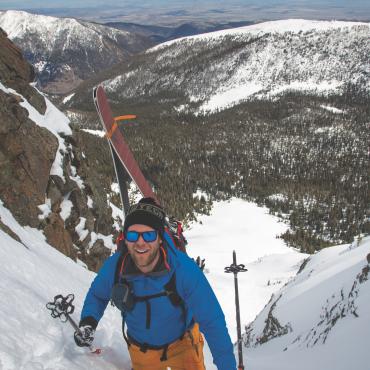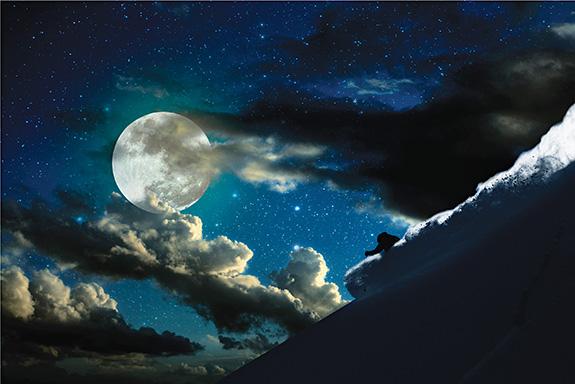Night & Day
Change your perspective.
“The world is full of magic things, patiently waiting for our senses to grow sharper.” ―W.B. Yeats
It’s midnight on a Thursday in February. From a ridge crest in the northern Bridgers, the lights of Bozeman sprawl across the Gallatin Valley while a stiff wind blasts relentlessly up the west slope. My partner climbs a final switchback to meet me, his form silhouetted by cold, grey moonlight. We step out of our skis and sip water that has begun to freeze in the bottle, and we take in the night. We speak little—there’s not much to say. This is a strange place to be and a strange time to be here. So, we think silent thoughts and stand in the wind and moonlight alone together.
I’ve lived in Bozeman for nearly 20 years. This landscape, these mountains, the rivers and plains—they’re home. In those early years, it felt magic. Everything was new and novel—every view, every trail, every nook and cranny at Bridger Bowl, every backcountry peak. Over time and change and growth and age and all of the other things that kill novelty and wonder, the magic has become harder to find. When it comes right down to it, that’s why I’m here, in the middle of the night, skiing under the peculiar light of a winter moon. I’m looking for some magic.
Moonlight has an ancient quality. Its shadows are soft-edged, as if the light is bending, and it seems to come from everywhere, all at once. We rip skins and buckle boots, and I think of the countless other times I’ve stood here. Great days, many of them, though in my memory they blend together into flashes of powder and sunshine and the faces of friends. This feels different.
Pushing off the ridge, each turn results in an effervescent explosion of light against a deep-sea periphery. This moonlight, while bright enough to navigate by, is a slower kind of light—there’s a visual lag between each powder cloud that explodes under my edges and the next turn. My brain rides a half-beat behind each metronome turn, and the effect is strangely satisfying.
My other senses rush to compensate. I hear each turn in ultrasonic detail—the gentle, leaning rush of initiation; a powerful cascade through the arc of the turn; and finally the sudden quiet of weightless transition. Below the ridge, the wind is gone, and I can taste cold night in my throat. The snow pushes underfoot, and it’s like riding sine waves of pressure and release.
At the bottom, we high-five and whoop like coyotes after a hare, and the silent solemnity I felt at the ridge is gone. It’s midnight on a Thursday in February, and we just skied 1,500 feet of moonlit powder. It felt weird and wonderful and new and novel. There is still magic here, burning bright under a full moon in familiar mountains made new. The difference is perspective—and the difference is night and day.






